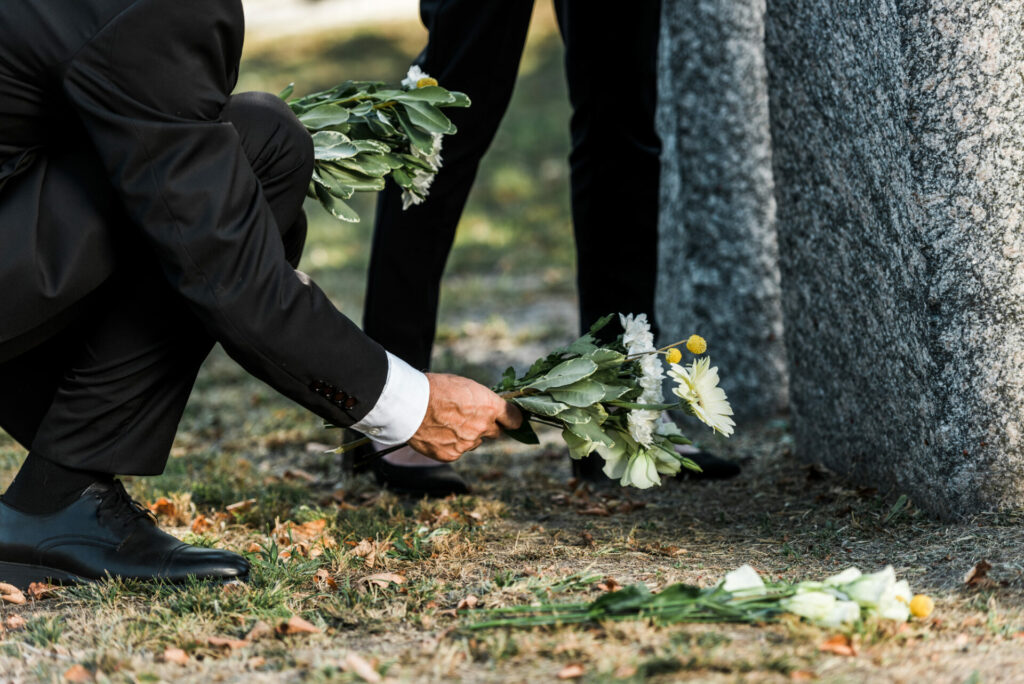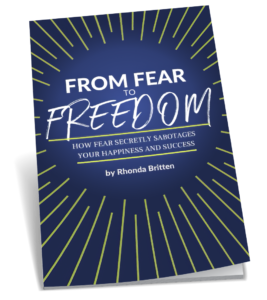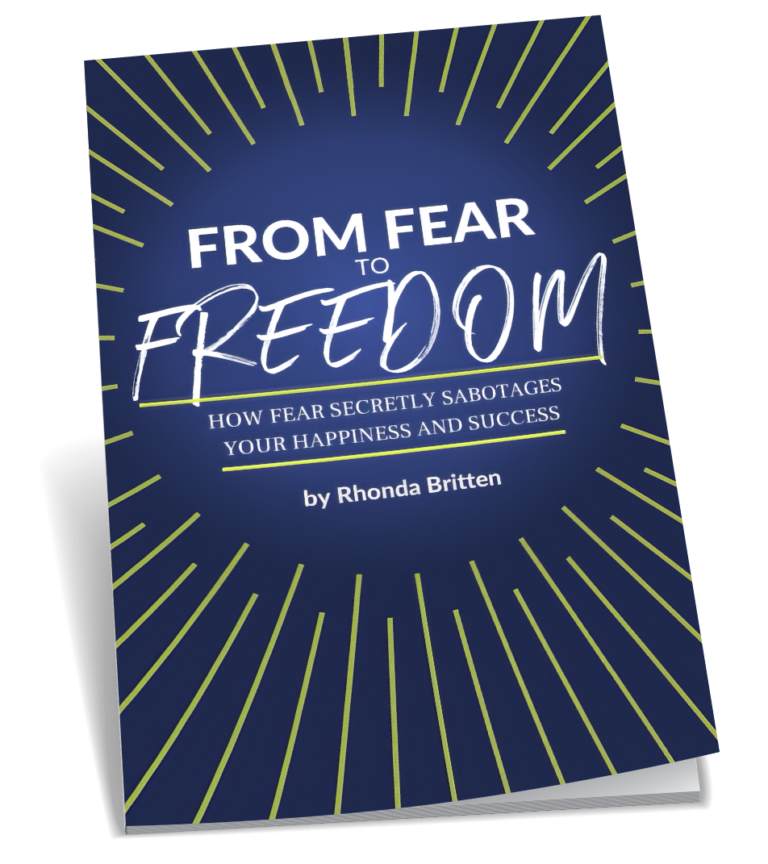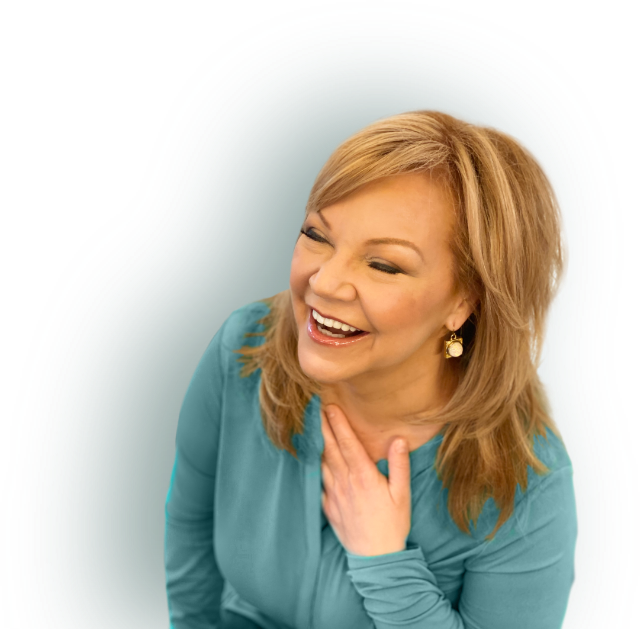Today, you and I are here to talk about fear of loss, and it’s not going to be easy. The topic may be triggering for you if you’ve lost someone you loved in the past or are worried about losing someone you care about in the near future.
Know that you’re not alone. Speaking about loss is a deeply painful topic for me. As many of you may know from other Fearless Living teachings, I lost my mother and father in a matter of seconds when my father murdered my mother and killed himself in front of me.
Talking about loss hits close to home, but I know from many, many years of hiding from my feelings that I am much better off embracing, examining, and working through these feelings than I am ignoring them.
I am now in a place where I feel comfortable talking about loss, and I understand my own boundaries on the subject. That’s what I hope for you too.

No matter your age, we’ve all experienced loss, which makes this topic so special. And fear of loss goes well beyond death anxiety. It can overcome our decision making and hold us back because we fear all of the little things we might come to lose if we make a change.
In this article, I’ll break down what fear of loss is, the symptoms of fear of loss, and what steps you can take to get over your fear of loss.
Let’s get started!
A Fearless Living Introduction: Overcoming Fear
Often, when we think about fear, we think of common phobias like a fear of heights, clowns, or public speaking. While these are certainly real fears, they’re not the fears we discuss at Fearless Living.
Our focus at Fearless Living is on emotional fears—the ones that penetrate deep into the heart of our mental health and wellness. Consciously or unconsciously, these emotional fears influence our decisions, causing us to make decisions that push us farther away from realizing our dreams and desires and living the life our soul intended.™
The 10 most common emotional fears are:
- Fear of Failure
- Fear of Success
- Fear of Intimacy
- Fear of the Unknown
- Fear of Loneliness
- Fear of Not Being Good Enough
- Fear of Loss
- Fear of Change
- Fear of Being Judged
- Fear of Rejection
If you’re looking for details, I’ll continue to discuss and break down each of the fundamental fears we discuss at Fearless Living right here on this blog. For a general overview of each type of fear and the difference between common phobias and irrational fears vs. emotional fears, read: 10 Common Types of Fear and How to Overcome Them.
What Is the Fear of Loss Called, and Why Do I Fear Loss?
In scientific terms, fear of loss is called Thanatophobia. In these terms, it could mean you fear death for a family member or loved ones or you fear your own death.
When a fear of losing someone develops into intense anxiety, it is considered an anxiety disorder. Anxiety disorders are serious business and should never be taken lightly. They can cause panic attacks, psychological distress, manifest in debilitating physical symptoms, and could develop into depressive disorders or mental disorders. IMPORTANT NOTE: If you experience these very real and serious symptoms, speak to your doctor or a mental health professional.
However, when we talk about fear of loss at Fearless Living, we’re talking about the deeply ingrained fear that’s holding you back from reaching your true potential. You might not even realize you’re beholden to a fear of loss if you don’t understand the symptoms.
So, what are the symptoms of a fear of loss?
Here are the top symptoms of the fear of loss. Do any of these resonate with you?
- You are overwhelmingly concerned about someone you love.
- You have anxiety about your future.
- You are worried about making the right decisions.
- You have nightmares about loss.
- You doubt your resilience.
- You feel like it's the end of the world if something goes wrong.
- You say yes just so you don’t miss out.
- You often buy things “just in case.”
- You buy things you don’t need or want.
- You get attached to belongings, people, and situations.
- You want things to stay the same and are nostalgic for the past.
- You agree with others so that you won’t lose them.
- You cannot lose control.
- You’d rather avoid loss than experience a future gain.
- You’re not sure you’re good enough.
Fear of loss signals an attachment to something—a person, job, object, lifestyle, or so on—that is at risk of being lost.
Fear of loss can make you feel paralyzed, unable to take action. You know what you want, but getting what you want may cause you to lose out in another aspect of your life, so you don’t act. Or you may run away from what you truly want because you fear if you get it, you will one day lose it.
You want more love, but you avoid looking for it because you’re too afraid you will lose what you already have… Which means you will never find the love you yearn for. You don't go after your dream job because you fear one day you will lose it… Which means you never get that dream job.
Sound familiar? 🙋♀️
So many people never reach for what they want because reaching for it means they could lose it. It is better to imagine it, to dream it, than to make it happen. A dream unattempted is still a dream, which is better, in some people’s minds, than an attempt that fell short. In other words… a FAILURE. 😱
This could also indicate a fear of failure, another emotional fear I break down further in my article: How to Overcome Your Fear of Failure.
That's how seductive fear is. It makes you think dreaming is better than working and achieving.
Fear of loss is so, so, SO strong. Studies have shown the impact of losing something is twice as powerful as the impact of gaining something.
If you want a clear and simple picture of the fear of loss, let me tell you a story I think most of you will relate to. Recently, I cleaned out my garage. I hired a company to pull everything out and put it on my deck and lawn so that I could go through it. I figured I would get rid of a few things, but mostly, I just wanted to get it sorted and organized. After all, it was work stuff, and I didn’t think I needed to get rid of much.
But there was a lot more there than I expected! And in trying to tidy and get rid of what I didn't need, I literally experienced the fear of loss in every box I opened.
Will I need that again?
Is that important?
Awe… Remember that?
What a great memory!
What if I never find anything like this again?
It all went through my head. These “things” have been in my garage for 10-15 years, but as I opened each box, it felt like I HAD TO HAVE IT. Even though I haven't seen these things in 15 years. It could be a piece of paper. A piece of PAPER. As I uncovered each one and considered throwing it out, I went through the experience of loss.
We can see the same scenario play out with financial decisions. Most of us would rather put energy into not losing money than gaining wealth. I see this with so many of my clients, and I’ve been there myself.
You avoid losing money, no matter what it costs. You avoid losing relationships, and you avoid losing what's familiar. We often make poor decisions to avoid loss. We stay in relationships that aren't working. We live in homes we don't like. We buy things we don't need. We keep gym memberships because we have a deal. We fail to invest in ourselves because we are afraid to part with money.
Fear of loss keeps us from making any gains in life.
In essence, even if we are desperate to grow, we say no to opportunities and fail to invest in ourselves.
How to Overcome Your Fear of Loss

There is some good news though: You can DO SOMETHING about your fear of loss!
Ask Yourself, What Are You Afraid to Lose?
The first step is self-awareness. Ask yourself, what are you afraid to lose?
Is it money, success, family, friends, time, health? Being aware of what you fear to lose will help ground your thoughts in reality.
Our fear of loss is usually strongest when life is good. When I won my Emmy, I was afraid I would lose everything. When I wrote my book, I was afraid I’d never accomplish anything else after that.
In times of success, fear of loss comes raging in. When we are at the pinnacle of success, we worry we will lose it. Our mind manufactures stories that “put us in our place.” Fear of loss whispers in our ears that we will lose everything.
It’s in these times I encourage you to ask yourself, “What am I actually afraid to lose?” How much is fear taking over? Most often, when you work through all of the “what ifs,” you’ll see that these “what ifs” are either very unlikely or not actually worth worrying about.
For example, you might be in a store and notice your favorite shampoo is on sale, so your impulse is to buy as many as possible. Even in this simple scenario, fear is leading the charge, making you think you need to buy six bottles.
But if you stop and think about it, what are you afraid of?
That you’re going to run out of shampoo? When will you run out of shampoo? Well, let’s say you go through one bottle a month. Does that mean you need six bottles right now? What happens if you get down to your last bottle? Will you be able to buy it again? What will happen if you have to pay 50 cents more for a bottle next month? Is that a cost you can afford? Will anything bad actually happen if you pay full price for a bottle of shampoo next month?
Sales pull on our fears, making us think we have to buy now. We have to buy it because this is our last chance. The sale won’t be around again. You’ll have to pay more if I wait. But in the grand scheme of things, waiting to buy something or not buying anything at all isn’t that big of a risk.
Understand That Loss and Gain Are Connected
Understand that for every loss there is a gain.
For every loss, there is new potential.
But to gain, you must be willing to lose.
As we grow, we face a vast number of crossroads, and when you’re in the midst of a big decision, two different losses are competing for your attention. Choosing something different is relinquishing what you know. You are giving something up. There will be loss.
For example, moving in with a partner means losing the apartment you love and the space you know. Moving to Thailand means losing the comfort of friends and family and all that’s familiar. Getting married means giving up single life and the ability to make your own decisions without a discussion, among other things. Quitting your job means leaving behind security and a job you already know how to do.
Pursuing something new means giving up what you know, which can feel very scary! And for some people, the idea of losing what they know is too much; it keeps them in a perpetual state of putting their dreams on hold.
There are always competing losses that come with any decision. Fear convinces you that it’s better to stick to the status quo. Fear convinces you that the path of least resistance is best because you will never lose what you have. But in doing so, fear keeps you from gaining anything new. It keeps you from making progress. Fear of loss keeps you from living the life your soul intended.™
Let’s look at our examples a little further. If moving in with your partner means losing your own space, it also means growing your relationship, finding out if you’re actually compatible, and gaining the many special moments you’ll share together instead of alone.
If moving to Thailand means losing proximity to family and friends, it also means saving money you can use in the future, living surrounded by a gorgeous backdrop, and learning more about yourself, other cultures, and the world at large than you ever could at home.
If getting married means losing that single life, it also means a future of love and support. It means having someone who always has your back, someone you can grow a family with.
If leaving your job means losing the security of what you know, it also equates to unlimited potential as you explore careers that are better suited to your dreams, like life coaching!
Simply understanding the connection between these two forces can help you break free from the chains of fear that are holding you back.
You won’t be able to get what you want or achieve your dream life if you're always stuck in what you know. You will absolutely lose aspects of your life in order to move forward, but what’s important is keeping sight of what you will gain.
Build Awareness That Death and Loss Are Part of Life

Death is tragic, but there’s also no changing the fact it’s a part of life. It’s something we will all face. There is no getting around it, and the more you fight against it, and the more you let fear overcome you, the worse it will be for you and those you love.
When you embrace that life goes on, time keeps moving forward, and you will get through it, death becomes part of the beauty of life.
Death and loss are part of the journey of being alive.
Death is part of our human reality. Impermanence pushes us forward and encourages us to live for the current moment. Going through loss at any age can be devastating, but it’s in the midst of a loss that we discover our own resilience and strength.
And loss comes in more forms than death. It could be loss of a job, loss of wealth, loss of innocence, loss of your home, etc. Your children growing up and leaving your home is a loss, but it's one that’s part of life’s journey, and one that comes with great gain for their own development.
Loss doesn’t make you a loser. It’s part of your journey, and the real question is what are you going to do about it? How are you going to face this challenge? How will you face this loss and change in your life? Will you face it head-on, or will you turn and run, struggling in vain to hold on to something that’s impossible to hold on to?
Remember, we all have the power to choose how we react.
While there’s a lot of life we can’t control, we can control our own actions. I had no control over what happened to my parents on that terrible day. No matter how much I believed for so long that it was my fault and that I could have done something to change things, those events were out of my control. But that didn’t mean I didn’t have any control. I needed to learn what was within my circle of control.
Let’s dig into that a bit further.
Let Go of What You Can’t Control
Letting go of the uncontrollable is a big step in overcoming your fear of loss. You can’t control someone else’s health or death date. You can’t control what other people say or whether or not the weather cooperates.
Trying to take responsibility for things that are outside of your control pulls you out of the moment and stops you from living in the present.
You can’t live in the present while you’re obsessed with what’s out of your control because you’re acting based on a future worry or past regret. You’re making choices based on a future (potential) failure or a future loss. But all of these things are unpredictable and uncertain—they’re not what’s happening right now in the present.
Let go of what you can’t control, and use the power and energy you gain to focus on what’s actually within your control. Letting go of what you can’t control doesn’t make you powerless. It actually makes you more powerful because you’re able to refocus your energy where it matters most.
You can control how you react.
You can control what you say.
You can control what you buy.
You can control how you spend your time.
You can control how you treat other people.
You can control how you treat yourself.
Because as much as fear doesn’t want you to believe it—you always have a choice. You choose whether or not a setback is a lesson. You choose how you react to other people, even when they make choices you don’t agree with. You choose whether you take a step toward your dreams or continue to push them further away.
Cracking Your Fear of Loss With Fearless Living
Of course, this is only the very beginning. Fear of loss can have a strong hold on us, which means it’s a tough egg to crack! This article only scratches the surface of tackling and finally curing your fear of loss. I have a full course dedicated to fear of loss, which digs so much deeper than I’m able to go in this single written guide.
A Fearless You membership gives you access to the entire How to Overcome Fear series, which includes the 10 most common fears, including Fear of Change, Fear of Failure, Fear of Intimacy, and more.
The How to Overcome Fear Series is available to you for as long as you have a Fearless You membership. The membership also comes with dozens of other courses, lessons, and live sessions. The entire Fearless You library will be just a click away, ready to help you live the life your soul intended.™
Learn more about Fearless You and continue following the Fearless Living blog for free weekly content on everything from finding and following your soul purpose to how to get unstuck in 6 steps to how to forgive even when it feels impossible.
Today, you and I are here to talk about fear of loss, and it’s not going to be easy. The topic may be triggering for you if you’ve lost someone you loved in the past or are worried about losing someone you care about in the near future.
Know that you’re not alone. Speaking about loss is a deeply painful topic for me. As many of you may know from other Fearless Living teachings, I lost my mother and father in a matter of seconds when my father murdered my mother and killed himself in front of me.
Talking about loss hits close to home, but I know from many, many years of hiding from my feelings that I am much better off embracing, examining, and working through these feelings than I am ignoring them.
I am now in a place where I feel comfortable talking about loss, and I understand my own boundaries on the subject. That’s what I hope for you too.

No matter your age, we’ve all experienced loss, which makes this topic so special. And fear of loss goes well beyond death anxiety. It can overcome our decision making and hold us back because we fear all of the little things we might come to lose if we make a change.
In this article, I’ll break down what fear of loss is, the symptoms of fear of loss, and what steps you can take to get over your fear of loss.
Let’s get started!
A Fearless Living Introduction: Overcoming Fear
Often, when we think about fear, we think of common phobias like a fear of heights, clowns, or public speaking. While these are certainly real fears, they’re not the fears we discuss at Fearless Living.
Our focus at Fearless Living is on emotional fears—the ones that penetrate deep into the heart of our mental health and wellness. Consciously or unconsciously, these emotional fears influence our decisions, causing us to make decisions that push us farther away from realizing our dreams and desires and living the life our soul intended.™
The 10 most common emotional fears are:
- Fear of Failure
- Fear of Success
- Fear of Intimacy
- Fear of the Unknown
- Fear of Loneliness
- Fear of Not Being Good Enough
- Fear of Loss
- Fear of Change
- Fear of Being Judged
- Fear of Rejection
If you’re looking for details, I’ll continue to discuss and break down each of the fundamental fears we discuss at Fearless Living right here on this blog. For a general overview of each type of fear and the difference between common phobias and irrational fears vs. emotional fears, read: 10 Common Types of Fear and How to Overcome Them.
What Is the Fear of Loss Called, and Why Do I Fear Loss?
In scientific terms, fear of loss is called Thanatophobia. In these terms, it could mean you fear death for a family member or loved ones or you fear your own death.
When a fear of losing someone develops into intense anxiety, it is considered an anxiety disorder. Anxiety disorders are serious business and should never be taken lightly. They can cause panic attacks, psychological distress, manifest in debilitating physical symptoms, and could develop into depressive disorders or mental disorders. IMPORTANT NOTE: If you experience these very real and serious symptoms, speak to your doctor or a mental health professional.
However, when we talk about fear of loss at Fearless Living, we’re talking about the deeply ingrained fear that’s holding you back from reaching your true potential. You might not even realize you’re beholden to a fear of loss if you don’t understand the symptoms.
So, what are the symptoms of a fear of loss?
Here are the top symptoms of the fear of loss. Do any of these resonate with you?
- You are overwhelmingly concerned about someone you love.
- You have anxiety about your future.
- You are worried about making the right decisions.
- You have nightmares about loss.
- You doubt your resilience.
- You feel like it's the end of the world if something goes wrong.
- You say yes just so you don’t miss out.
- You often buy things “just in case.”
- You buy things you don’t need or want.
- You get attached to belongings, people, and situations.
- You want things to stay the same and are nostalgic for the past.
- You agree with others so that you won’t lose them.
- You cannot lose control.
- You’d rather avoid loss than experience a future gain.
- You’re not sure you’re good enough.
Fear of loss signals an attachment to something—a person, job, object, lifestyle, or so on—that is at risk of being lost.
Fear of loss can make you feel paralyzed, unable to take action. You know what you want, but getting what you want may cause you to lose out in another aspect of your life, so you don’t act. Or you may run away from what you truly want because you fear if you get it, you will one day lose it.
You want more love, but you avoid looking for it because you’re too afraid you will lose what you already have… Which means you will never find the love you yearn for. You don't go after your dream job because you fear one day you will lose it… Which means you never get that dream job.
Sound familiar? 🙋♀️
So many people never reach for what they want because reaching for it means they could lose it. It is better to imagine it, to dream it, than to make it happen. A dream unattempted is still a dream, which is better, in some people’s minds, than an attempt that fell short. In other words… a FAILURE. 😱
This could also indicate a fear of failure, another emotional fear I break down further in my article: How to Overcome Your Fear of Failure.
That's how seductive fear is. It makes you think dreaming is better than working and achieving.
Fear of loss is so, so, SO strong. Studies have shown the impact of losing something is twice as powerful as the impact of gaining something.
If you want a clear and simple picture of the fear of loss, let me tell you a story I think most of you will relate to. Recently, I cleaned out my garage. I hired a company to pull everything out and put it on my deck and lawn so that I could go through it. I figured I would get rid of a few things, but mostly, I just wanted to get it sorted and organized. After all, it was work stuff, and I didn’t think I needed to get rid of much.
But there was a lot more there than I expected! And in trying to tidy and get rid of what I didn't need, I literally experienced the fear of loss in every box I opened.
Will I need that again?
Is that important?
Awe… Remember that?
What a great memory!
What if I never find anything like this again?
It all went through my head. These “things” have been in my garage for 10-15 years, but as I opened each box, it felt like I HAD TO HAVE IT. Even though I haven't seen these things in 15 years. It could be a piece of paper. A piece of PAPER. As I uncovered each one and considered throwing it out, I went through the experience of loss.
We can see the same scenario play out with financial decisions. Most of us would rather put energy into not losing money than gaining wealth. I see this with so many of my clients, and I’ve been there myself.
You avoid losing money, no matter what it costs. You avoid losing relationships, and you avoid losing what's familiar. We often make poor decisions to avoid loss. We stay in relationships that aren't working. We live in homes we don't like. We buy things we don't need. We keep gym memberships because we have a deal. We fail to invest in ourselves because we are afraid to part with money.
Fear of loss keeps us from making any gains in life.
In essence, even if we are desperate to grow, we say no to opportunities and fail to invest in ourselves.
How to Overcome Your Fear of Loss

There is some good news though: You can DO SOMETHING about your fear of loss!
Ask Yourself, What Are You Afraid to Lose?
The first step is self-awareness. Ask yourself, what are you afraid to lose?
Is it money, success, family, friends, time, health? Being aware of what you fear to lose will help ground your thoughts in reality.
Our fear of loss is usually strongest when life is good. When I won my Emmy, I was afraid I would lose everything. When I wrote my book, I was afraid I’d never accomplish anything else after that.
In times of success, fear of loss comes raging in. When we are at the pinnacle of success, we worry we will lose it. Our mind manufactures stories that “put us in our place.” Fear of loss whispers in our ears that we will lose everything.
It’s in these times I encourage you to ask yourself, “What am I actually afraid to lose?” How much is fear taking over? Most often, when you work through all of the “what ifs,” you’ll see that these “what ifs” are either very unlikely or not actually worth worrying about.
For example, you might be in a store and notice your favorite shampoo is on sale, so your impulse is to buy as many as possible. Even in this simple scenario, fear is leading the charge, making you think you need to buy six bottles.
But if you stop and think about it, what are you afraid of?
That you’re going to run out of shampoo? When will you run out of shampoo? Well, let’s say you go through one bottle a month. Does that mean you need six bottles right now? What happens if you get down to your last bottle? Will you be able to buy it again? What will happen if you have to pay 50 cents more for a bottle next month? Is that a cost you can afford? Will anything bad actually happen if you pay full price for a bottle of shampoo next month?
Sales pull on our fears, making us think we have to buy now. We have to buy it because this is our last chance. The sale won’t be around again. You’ll have to pay more if I wait. But in the grand scheme of things, waiting to buy something or not buying anything at all isn’t that big of a risk.
Understand That Loss and Gain Are Connected
Understand that for every loss there is a gain.
For every loss, there is new potential.
But to gain, you must be willing to lose.
As we grow, we face a vast number of crossroads, and when you’re in the midst of a big decision, two different losses are competing for your attention. Choosing something different is relinquishing what you know. You are giving something up. There will be loss.
For example, moving in with a partner means losing the apartment you love and the space you know. Moving to Thailand means losing the comfort of friends and family and all that’s familiar. Getting married means giving up single life and the ability to make your own decisions without a discussion, among other things. Quitting your job means leaving behind security and a job you already know how to do.
Pursuing something new means giving up what you know, which can feel very scary! And for some people, the idea of losing what they know is too much; it keeps them in a perpetual state of putting their dreams on hold.
There are always competing losses that come with any decision. Fear convinces you that it’s better to stick to the status quo. Fear convinces you that the path of least resistance is best because you will never lose what you have. But in doing so, fear keeps you from gaining anything new. It keeps you from making progress. Fear of loss keeps you from living the life your soul intended.™
Let’s look at our examples a little further. If moving in with your partner means losing your own space, it also means growing your relationship, finding out if you’re actually compatible, and gaining the many special moments you’ll share together instead of alone.
If moving to Thailand means losing proximity to family and friends, it also means saving money you can use in the future, living surrounded by a gorgeous backdrop, and learning more about yourself, other cultures, and the world at large than you ever could at home.
If getting married means losing that single life, it also means a future of love and support. It means having someone who always has your back, someone you can grow a family with.
If leaving your job means losing the security of what you know, it also equates to unlimited potential as you explore careers that are better suited to your dreams, like life coaching!
Simply understanding the connection between these two forces can help you break free from the chains of fear that are holding you back.
You won’t be able to get what you want or achieve your dream life if you're always stuck in what you know. You will absolutely lose aspects of your life in order to move forward, but what’s important is keeping sight of what you will gain.
Build Awareness That Death and Loss Are Part of Life

Death is tragic, but there’s also no changing the fact it’s a part of life. It’s something we will all face. There is no getting around it, and the more you fight against it, and the more you let fear overcome you, the worse it will be for you and those you love.
When you embrace that life goes on, time keeps moving forward, and you will get through it, death becomes part of the beauty of life.
Death and loss are part of the journey of being alive.
Death is part of our human reality. Impermanence pushes us forward and encourages us to live for the current moment. Going through loss at any age can be devastating, but it’s in the midst of a loss that we discover our own resilience and strength.
And loss comes in more forms than death. It could be loss of a job, loss of wealth, loss of innocence, loss of your home, etc. Your children growing up and leaving your home is a loss, but it's one that’s part of life’s journey, and one that comes with great gain for their own development.
Loss doesn’t make you a loser. It’s part of your journey, and the real question is what are you going to do about it? How are you going to face this challenge? How will you face this loss and change in your life? Will you face it head-on, or will you turn and run, struggling in vain to hold on to something that’s impossible to hold on to?
Remember, we all have the power to choose how we react.
While there’s a lot of life we can’t control, we can control our own actions. I had no control over what happened to my parents on that terrible day. No matter how much I believed for so long that it was my fault and that I could have done something to change things, those events were out of my control. But that didn’t mean I didn’t have any control. I needed to learn what was within my circle of control.
Let’s dig into that a bit further.
Let Go of What You Can’t Control
Letting go of the uncontrollable is a big step in overcoming your fear of loss. You can’t control someone else’s health or death date. You can’t control what other people say or whether or not the weather cooperates.
Trying to take responsibility for things that are outside of your control pulls you out of the moment and stops you from living in the present.
You can’t live in the present while you’re obsessed with what’s out of your control because you’re acting based on a future worry or past regret. You’re making choices based on a future (potential) failure or a future loss. But all of these things are unpredictable and uncertain—they’re not what’s happening right now in the present.
Let go of what you can’t control, and use the power and energy you gain to focus on what’s actually within your control. Letting go of what you can’t control doesn’t make you powerless. It actually makes you more powerful because you’re able to refocus your energy where it matters most.
You can control how you react.
You can control what you say.
You can control what you buy.
You can control how you spend your time.
You can control how you treat other people.
You can control how you treat yourself.
Because as much as fear doesn’t want you to believe it—you always have a choice. You choose whether or not a setback is a lesson. You choose how you react to other people, even when they make choices you don’t agree with. You choose whether you take a step toward your dreams or continue to push them further away.
Cracking Your Fear of Loss With Fearless Living
Of course, this is only the very beginning. Fear of loss can have a strong hold on us, which means it’s a tough egg to crack! This article only scratches the surface of tackling and finally curing your fear of loss. I have a full course dedicated to fear of loss, which digs so much deeper than I’m able to go in this single written guide.
A Fearless You membership gives you access to the entire How to Overcome Fear series, which includes the 10 most common fears, including Fear of Change, Fear of Failure, Fear of Intimacy, and more.
The How to Overcome Fear Series is available to you for as long as you have a Fearless You membership. The membership also comes with dozens of other courses, lessons, and live sessions. The entire Fearless You library will be just a click away, ready to help you live the life your soul intended.™
Learn more about Fearless You and continue following the Fearless Living blog for free weekly content on everything from finding and following your soul purpose to how to get unstuck in 6 steps to how to forgive even when it feels impossible.







